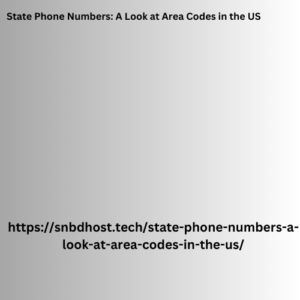Unwanted telemarketing calls can be a nuisance, disrupting your day and pushing unwanted products or services. In some cases, these calls can even be harassing or involve scams. If you’re on the receiving end of a barrage of telemarketing calls, you might wonder if legal action is an option. This article explores the possibility of suing a telemarketer for repeated calls and what steps you can take to stop them.
Understanding Telemarketing Regulations
The good news is there State Phone Numbers: A Look at Area Codes in the US are regulations in place to limit telemarketing calls. The Federal Trade Commission (FTC) enforces the Telemarketing Sales Rule (TSR), which outlines rules for telemarketers, including:
- Prior consent: Telemarketers generally need your prior written consent to call you with offers to sell products or services.
- Do Not Call Registry: You can register your phone number on the National Do Not Call Registry which prohibits most telemarketers from calling you after 31 days.
- Call times: Telemarketers can only call you between 8:00 am and 9:00 pm local time.
When Can You Sue a Telemarketer
While suing a telemarketer might seem appealing, it’s not always the most practical solution. Lawsuits can be expensive and time-consuming. However, there are situations where legal action might be warranted:
- Violation of the Do Not Call Registry: If you’re on the Do Not Call Registry and you continue to receive calls from the same telemarketer, you may have grounds for a lawsuit, especially if the calls are frequent or harassing.
- Deceptive or misleading practices: If the telemarketer uses deceptive or misleading tactics to sell you something, such as false claims about a product or service, you might have a case for fraud.
- Automated calls without consent: The TSR restricts the use of robocalls (automated dialing systems) for telemarketing purposes. If you receive prerecorded telemarketing messages without prior consent, you may be able to sue.
What to Do Before Taking Legal Action
Before considering a lawsuit, there are steps you can take to stop unwanted calls:
- Tell the telemarketer to stop calling: This seems obvious, but it’s an important first step. Politely but firmly request that the telemarketer remove you from their call list. Keep a record of the date and time of the call, as well as the name of the company (if provided).
- Report the call to the FTC: You can report unwanted telemarketing calls to the FTC. This helps the FTC track down and take action against telemarketers who violate the TSR.
- Consider call blocking: Many phone carriers offer call blocking features that can help you block specific numbers or numbers with certain characteristics (e.g., area codes). There are also third-party call blocking apps available.
The Lawsuit Process
If you decide to sue a Why use google voice telemarketer, here’s a general idea of what to expect:
- Consult with an attorney: An attorney specializing in consumer protection law can advise you on the merits of your case and the best course of action.
- Gather evidence: This may include phone records showing the unwanted calls, copies of any correspondence you had with the telemarketer, and documentation of attempts to stop the calls.
- File a lawsuit: Your attorney will handle the legal paperwork and filing procedures.
- Pre-trial: The discovery phase involves exchanging information with the other party. This may involve depositions and requests for documents.
- Trial (optional): If a settlement cannot be reached, the case goes to trial. A judge or jury will decide the outcome.
- Damages: To win a lawsuit, you’ll need to show that you suffered actual damages due to the telemarketing calls. This could include emotional distress, financial losses, or wasted time. The amount of damages awarded will depend on the severity of the situation.
- Costs: Lawsuits can be expensive. Even if you win, court costs and attorney fees may eat into any awarded damages.
Alternatives to Lawsuits
In most cases, there are easier and less expensive ways to deal with unwanted telemarketing calls. Here are some options:
- Report the calls to the FTC: The FTC can investigate and take action against telemarketers who violate the law.
- Use call blocking: Many phone carriers and third-party apps offer call blocking features that can help you stop unwanted calls.


